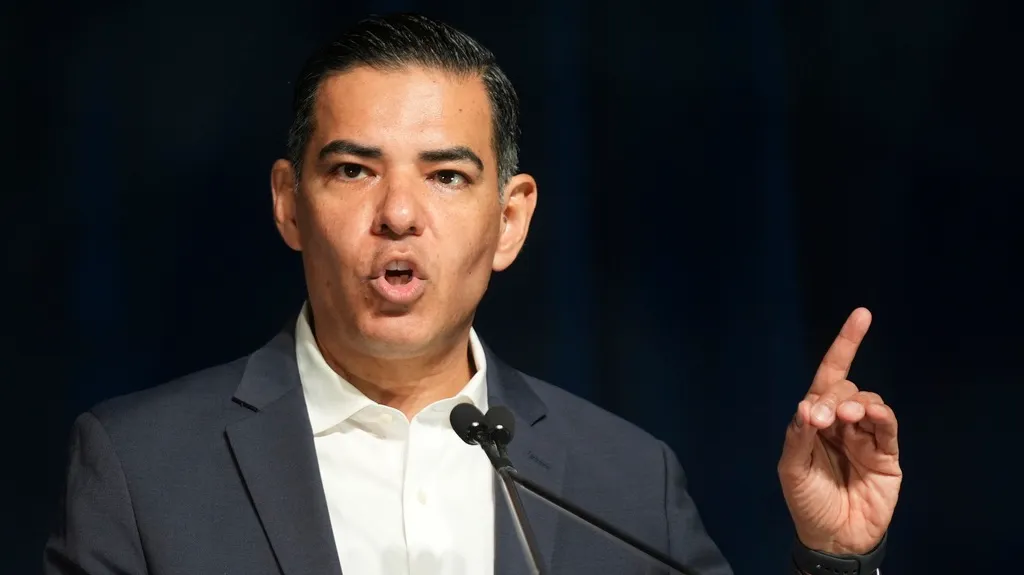October 14, 2011
Evangelical Pastors Divided Ahead of 2012 Caucuses
Kilian Melloy READ TIME: 4 MIN.
Four years ago, former Arkansas Gov. Mike Huckabee won Iowa's Republican presidential caucuses partly by locking up the support of evangelical pastors, the former Baptist minister's brethren and a potent voting bloc within the state's influential Christian conservatives.
Today, Iowa's increasingly political pastors are up for grabs, divided on whom to support from a GOP field that features several candidates who call themselves born-again Christians.
"More pastors are engaged than four years ago," said Jeff Mullen, who leads one of the Des Moines area's largest evangelical churches. "But there are more choices."
And all have come calling.
Minnesota Rep. Michele Bachmann, a political product of her state's evangelical conservative movement, has met regularly with groups of pastors across Iowa since before she officially entered the race. But they're also being pursued by businessman Herman Cain, who is an associate pastor at his Atlanta church, and former Pennsylvania Sen. Rick Santorum, whose first stop in Iowa as a presidential prospect was to the Des Moines area's most politically active church.
Texas Gov. Rick Perry, who hosted an evangelical gathering that drew 30,000 to Houston in August before becoming a candidate, met with Iowa church leaders last month and during a recent visit to the heavily Christian northwest corner of Iowa. And former House Speaker Newt Gingrich has appeared at private pastor conferences in Iowa where he won some respect for his admission of personal failings during his two previous marriages.
Unlike past campaigns, the lack of an imposing establishment candidate in this race has opened a door for more candidates who appeal to the party's socially conservative base. Tea party supporters, new factors in the presidential nominating campaign, also largely share the evangelicals' social values.
"While we've called it in the past social conservatives or Christian or religious right, it's gotten much broader than that," said Greg Mueller, a Republican consultant who was a top adviser to Pat Buchanan's presidential campaigns. "And I think it's invited candidates into the race that see there's a connection there."
It's possible that such a conservative candidate will rise in coming weeks - and get the pastors to coalesce behind his or her candidacy.
But should pastors - and, by extension, evangelical voters - remain divided heading into the January caucuses, it's possible that Mitt Romney could emerge from the pack by rallying backers who put job and economic issues above social causes. Romney does receive some support from evangelicals, but he's unlikely to win over most of them. Many view him skeptically because of his Mormon faith and his past support of gay rights and abortion rights.
"A lot of pastors and social conservative activists are looking at each other and asking, 'What horse do we bet on here?' My sense is right now it's fairly muddled," said Ralph Reed, founder of the national Christian Coalition who now heads the Faith and Freedom Coalition.
"If Cain, Perry, Bachmann, Santorum and Gingrich split the social conservative vote, Romney could gain critical mass among party regulars. The polling backs that up. It could get very interesting," Reed added.
His group is hosting a forum in Des Moines on Oct. 22 where several of the candidates are slated to appear. Perry and Gingrich plan to speak at a pastor's conference in Florida two days earlier.
While pastors are power brokers with evangelicals across the country, their impact may be felt the most in Iowa, where exit polls show that born-again Christians comprise roughly 45 to 60 percent of the GOP caucus base.
Iowa pastors have long been involved in politics but more became active after the Iowa Supreme Court's 2009 decision allowing gay marriage, which incensed many. The ruling also has intensified the scrutiny of the social conservative candidates.
The pastors see faults in all.
While Bachmann's aides have been vigilant about reaching out to pastors, she has developed a reputation for being late and has kept some pastors waiting for scheduled telephone calls. Some never came. And, pastors privately say, she faces doubts from some members of the evangelical clergy who oppose women in executive positions and others who question whether Muslim leaders would respect a woman president.
Santorum has come under scrutiny for his endorsement of former Pennsylvania Sen. Arlen Specter, a Republican who supported abortion rights. The endorsement is a turn-off on an issue at the very heart of the social conservative movement. Pastors have questioned him about it.
And some have objected strongly to Perry's 2007 executive order requiring school-age girls to be vaccinated against a sexually transmitted virus that can cause cancer.
Said Cary Gordon, pastor of a large Sioux City congregation: "Some clergy that might have been on his bandwagon might be having second thoughts."
No one running in 2012 has the profile of Huckabee, the 2008 caucus winner whose profile on conservative social causes and preaching style were stamped by the years he spent in the pulpit in Arkansas before entering politics.
"There was a groundswell for Gov. Huckabee, who believed in scripture unlike any candidate I've seen," said Kerry Jech, pastor of a large evangelical church in Marshalltown who supported Huckabee in 2008 and has been courted by several 2012 candidates. None have sold him.
"It's hard to know who to support this time," Jech said.
Kilian Melloy serves as EDGE Media Network's Associate Arts Editor and Staff Contributor. His professional memberships include the National Lesbian & Gay Journalists Association, the Boston Online Film Critics Association, The Gay and Lesbian Entertainment Critics Association, and the Boston Theater Critics Association's Elliot Norton Awards Committee.





